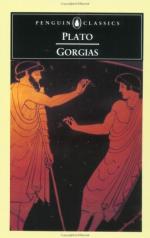
|
| Name: _________________________ | Period: ___________________ |
This test consists of 15 multiple choice questions and 5 short answer questions.
Multiple Choice Questions
1. How does Socrates regard just actions?
(a) As philosophical.
(b) As beautiful.
(c) As modern.
(d) As ancient.
2. Socrates believes that what is good while ugly can be delimited by what?
(a) Politics.
(b) Pain.
(c) Experience.
(d) Pleasures.
3. Why does Socrates regard Polus' responses as useless?
(a) Because he cannot comprehend him.
(b) Because Polus is uneducated.
(c) Because he uses elevated vocabulary.
(d) Because they are long speeches.
4. What does Socrates believe tyrannical power has little to do with?
(a) Greatness.
(b) Common sense.
(c) Humanity.
(d) Money.
5. What does the discussion of rhetoric between Gorgias and Socrates turn into?
(a) Nostalgic exchange.
(b) Comedic exchange.
(c) Argument.
(d) Sentimental rant.
6. What does Socrates believe is the greatest evil?
(a) To avoid punishment.
(b) To do wrong.
(c) To ignore wrong.
(d) To think highly of oneself.
7. What does Socrates not intend to do in his arguments?
(a) Frighten anyone.
(b) Listen to anyone.
(c) Discredit anyone.
(d) Influence anyone.
8. Gorgias believes that the most important things are health, wealth, and what?
(a) Justice.
(b) Courage.
(c) Generosity.
(d) Beauty.
9. What does Gorgias intend to use rhetoric for?
(a) To educate.
(b) To speak and comprehend.
(c) To manipulate a crowd.
(d) To frighten criminals.
10. According to Socrates, who are the second happiest people?
(a) Those who are healthy.
(b) Those who deliver others from evil.
(c) Those who only briefly suffer.
(d) Those who get married.
11. What kind of a result does Socrates believe any action taken must intend to elicit?
(a) An insignificant result.
(b) A short-term benefit.
(c) A self-indulgent result.
(d) A good result.
12. What does Socrates regard as the most damaging to one's soul?
(a) Exposure to evil.
(b) Malnourishment.
(c) Unjust actions.
(d) Bad relationships.
13. Gorgias believes the ability to do what has the most possibility for the greatest good?
(a) Persuade.
(b) Relate.
(c) Comprehend.
(d) Educate.
14. What does Socrates say defining areas of art is similar to defining?
(a) Political parties.
(b) Likes and dislikes.
(c) Body and soul.
(d) Generations.
15. Socrates makes the comparison: medicine is to sickness and justice is to _____.
(a) Anger.
(b) No education.
(c) Time.
(d) Wrongdoing.
Short Answer Questions
1. Who does Socrates believe power is beneficial to?
2. In Socrates' opinion, why is music useless?
3. Who does Socrates see professions influencing?
4. What does Gorgias believe rhetoric can be used for?
5. What does Gorgias describe gaining knowledge as involving?
|
This section contains 394 words (approx. 2 pages at 300 words per page) |

|




